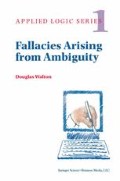Abstract
Equivocation (from the Latin aequi/vocare, to speak on both sides) is a fallacy that, on the surface, appears to be relatively straightforward, and described in many of the logic textbooks, and other standard sources. Many of these sources follow the Aristotelian definition of the fallacy, which, as we saw in Chapter 1, seems fairly clear. The definition of Alonzo Church in Runes’ Dictionary of Philosophy [1964, p. 96] seems to capture the gist of the Aristotelian conception fairly well.
Access this chapter
Tax calculation will be finalised at checkout
Purchases are for personal use only
Preview
Unable to display preview. Download preview PDF.
References
For example, Irving M. Copi, Introduction to Logic, 7th ed., p. 114. Macmillan, New York, 1986.
In the 1980 edition, there are two separate fallacies of ambiguity, one called ‘semantical ambiguity’ and one called ‘syntactical ambiguity’ . In the 1987 (second) edition, the one ‘fallacy of ambiguity’ is meant to cover both semantic and synthetic ambiguity.
Robinson [1941]—see below—cites a kind of ambiguity he calls misunderstanding, where the hearer takes what the speaker says in a different way than the speaker intended.
William of Sherwood, Introduction to Logic, trans. and ed. Norman Kretzmann, p. 136.
This proposal has been developed in a formal structure of dialogue by Mackenzie [1988].
Walton [1987, pp. 125—130].
Walton [1995].
Ibid.
Author information
Authors and Affiliations
Rights and permissions
Copyright information
© 1996 Springer Science+Business Media Dordrecht
About this chapter
Cite this chapter
Walton, D. (1996). Equivocation. In: Fallacies Arising from Ambiguity. Applied Logic Series, vol 1. Springer, Dordrecht. https://doi.org/10.1007/978-94-015-8632-0_2
Download citation
DOI: https://doi.org/10.1007/978-94-015-8632-0_2
Publisher Name: Springer, Dordrecht
Print ISBN: 978-90-481-4717-5
Online ISBN: 978-94-015-8632-0
eBook Packages: Springer Book Archive

